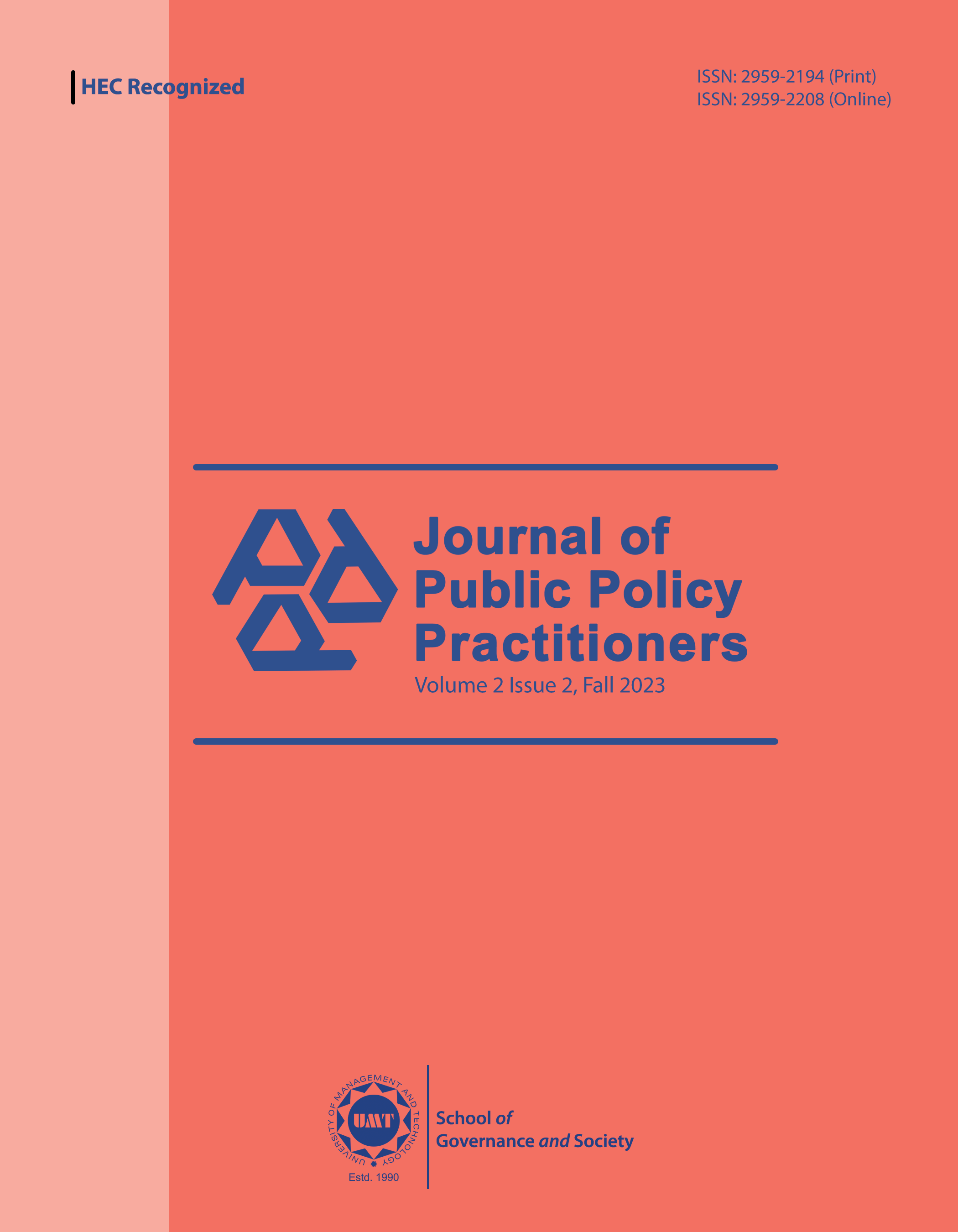Broadening of Tax Base: Policy Challenges and the Way Forward
Abstract
 Abstract Views: 0
Abstract Views: 0
The developmental process in Pakistan has been hindered due to the large informal economy and insufficient tax compliance. Successive governments have failed to change the mindset due to flawed policies, administrative constraints, and rambling corruption. The gap in tax revenue is due to tax evasion and avoidance practices. The economy is constrained by individuals who fiddle with policies that affect both the society and the state. The core issues have been delineated along with the potential results. Qualitative research method has been employed to analyze the performance, challenges, and prospects of broadening the tax base. The findings of the study portray that although the implementation of tax policy aimed to broaden the tax base has improved considerably, however, simplifying tax codes and making them clearer can improve compliance, reduce errors, and make the system fairer. This can be achieved by minimizing exemptions, deductions, and loopholes. This policy could prove beneficial for stakeholders, particularly the policymakers, to formulate the future tax policy and strategies in order to obtain maximum tax revenue.
Downloads
References
Amjad, M. (2021). Tax policy in Pakistan: Concerns and reforms. SSRN, Article e3791148. http://dx.doi.org/10.2139/ssrn.3791148
Cevik, S. (2016). Unlocking Pakistan's revenue potential. International Monetary Fund. https://www.imf.org/external/pubs/ft/wp/2016/wp16182.pdf
Diokno, B. E. (1993). Structural adjustment policies and the role of tax reform. Asian Development Review, 11(2), 140–153. https://doi.org/10.1142/S0116110593000119
Dyreng, S. D., Hanlon, M., & Maydew, E. L. (2019). When does tax avoidance result in tax uncertainty? The Accounting Review, 94(2), 179–203. https://doi.org/10.2308/accr-52198
Federal Board of Revenue Pakistan. (2022). Tax gap report 2022. https://download1.fbr.gov.pk/Docs/2023118141362748Tax-Gap-Report-2022-Final.pdf
Gemmell, N., & Hasseldine, J. (2012). The tax gap: a methodological review (Vol. 20). Emerald Group Publishing Limited.
Ghufran, M., Ashraf, J., Rizwan, M., Ali, S., & Aldieri, L. (2022). Tax base-broadening a light at the end of the tunnel in the fiscal consolidation dynamics. Modern Economy, 13(3), 397–424. https://doi.org/10.4236/me.2022.133022
Hamada, K. (1994). Broadening the tax base: The economics behind it. Asian Development Review, 12(2), 51–84. https://doi.org/10.1142/S0116110594000096
Khalid, M. (2020). Tax structure in Pakistan: Fragmented, exploitative and anti-growth. The Pakistan Development Review, 59(3), 461–468.
Malik, M. B. (2022). Appraisal of comprehensive scheme of increasing tax base proposed by FPCCI. Journal of Public Policy Practitioners, 1(2), 1–32. https://doi.org/10.32350/jppp.12.01
Mughal, M. (2012). Reasons of tax avoidance and tax evasion: Reflections from Pakistan. Journal of Economics and Behavioral Studies, 4(4), 217–222. https://doi.org/10.22610/jebs.v4i4.320
Oates, W. E., & Schwab, R. M. (2015). The window tax: A case study in excess burden. Journal of Economic Perspectives, 29(1), 163–180. https://doi.org/10.1257/jep.29.1.163
Parikh, K. (1994). Sustainable development and the role of tax policy. Asian Development Review, 13(1), 127–166. https://doi.org/10.1142/S0116110595000054
Prichard, W., Custers, A. L., Dom, R., Davenport, S. R., & Roscitt, M. A. (2019). Innovations in tax compliance: Conceptual framework. The World Bank. https://doi.org/10.1596/1813-9450-9032
Rana, S. (2021). Only 2.5m people file tax returns. The Tribune. https://tribune.com.pk/story/2324997/only-25m-people-file-tax-returns
The World Bank. (2019). Project information document. https://documents1.worldbank.org/curated/en/637701556009042302/pdf/Project-Information-Document-Pakistan-Revenue-Mobilization-Project-P165982.pdf
Copyright (c) 2023 Attiya Ammar

This work is licensed under a Creative Commons Attribution 4.0 International License.







